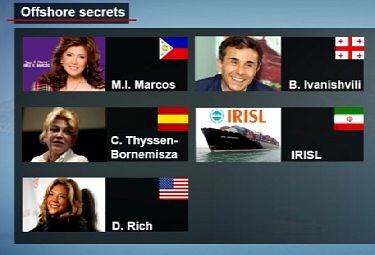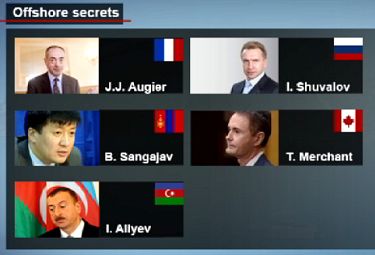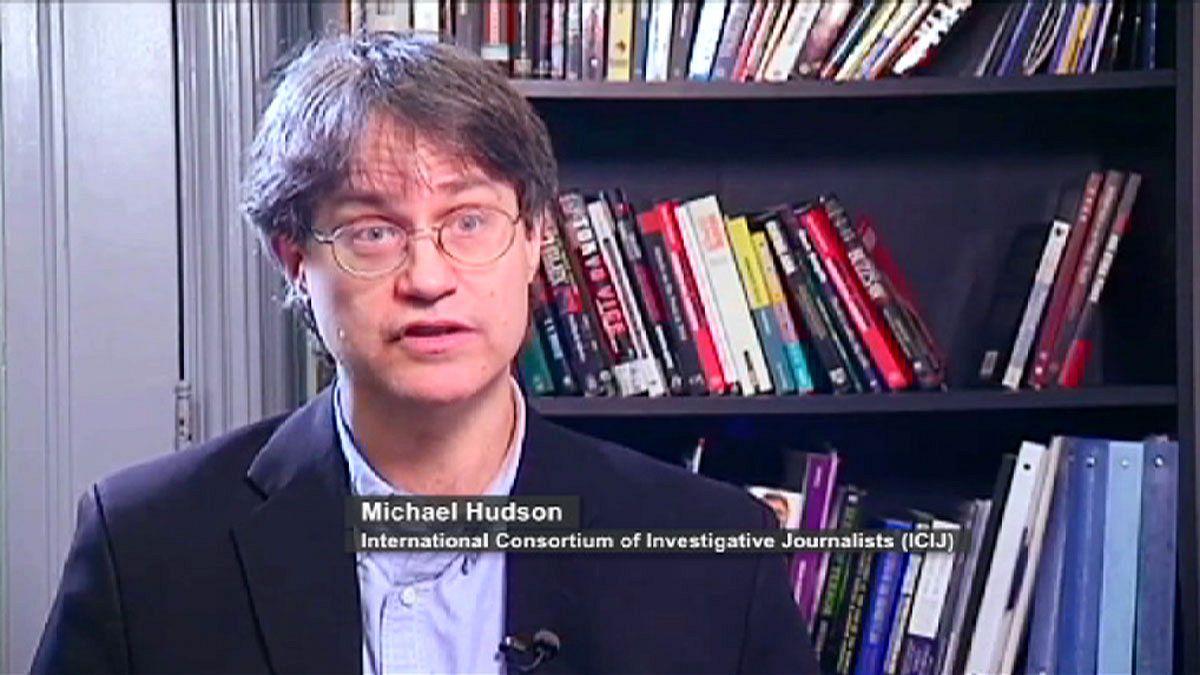The few hiding money in offshore banks from the many who do not have the luxury…
This is a story the International Consortium of Investigative Journalists, based in Washington, wants the world to know. That is why it has gone global with the first instalment of what it says is more than 260 gigabytes of data. In it are details of companies, trusts, intermediaries and the people who benefit.
Among some of the well-known identified are: a Philippino dictator’s daughter, a Spanish art baroness, the businessman-prime minister of Georgia, an Iranian shipping magnate and the ex-wife of a US commodities trader presidentially pardoned for tax evasion.
Then there is a member of France’s political elite, the wife of Russia’s deputy prime minister, the husband of a Canadian Senator, a former finance minister of Mongolia and the daughters of Azerbaijan’s head of state. The names come from more than 170 countries and territories.

The British Virgin Islands, the Cook Islands, Singapore, Cyprus – the multi-gigabyte scoop shows a booming tax haven industry selling secrecy to the extremely wealthy.
Switzerland, often shown the finger of blame for its ultra-discreet banking practices, so far is not on the hook. Only a minuscule proportion of the cover-blown names were linked to it.

The Swiss government’s man for dealing with international financial questions, Mario Tuor, said: “These revelations show that our financial market policy is on the right track, and that we do not want untaxed money in Switzerland, or any criminal money. We hope it shows that Switzerland is really doing something to achieve this goal. Perhaps other financial markets do less; they might have to implement similar to those of Switzerland.”
Meanwhile, the European Commission reacted to Thursday’s publishing of the data by exhorting, once again, EU member states to crack down on tax evasion.
Spokesman Olivier Bailly said: “There must be no going along with companies, individuals or third countries that get around European or national laws to commit tax fraud.”
Brussels says that tax evasion deprives the EU countries of more than one thousand billion euros per year – a trillion euros.
The Tax Justice Network promoting transparency in international finance says tax havens are hiding between fifteen trillion and twenty-three trillion euros of wealth.
If that is so, it makes the leaders’ promises at a get-tough G20 meeting four years ago ring hollow. They came in the wake of the 2008 global financial disaster.
Then British Prime Minister Gordon Brown said: “We have agreed there will be an end to tax havens that do not transfer information on request. The banking secrecy of the past must come to an end. And we have agreed tough standards and sanctions for use against those who don’t come into line in the future. “
The UK, G8 host in June, has a senior anti-corruption campaigner saying the Virgin Islands tax haven “stains the face of Britain”.
Interview with Michael Hudson
The ICIJ findings amount to an enormous body of work which was overseen by four senior editors.
One of them, Michael Hudson, spoke to the euronews Washington correspondent, Stefan Grobe.
“First we had to crunch and clean up the data, figure out how to get at the beast and get inside, how to sift through it. It is easy for Western journalists to parachute in and then spend a few weeks or a few days in a country and think they know everything, but it’s the reporters on the ground, they know the players, they know the law, they know the history, and it’s very important to have them there. And that’s what we did,” Hudson said.
“What we found is that a lot of these mega-rich folks use it to own their yachts and they use it – and I kind of knew that – but they use it to own their mansions, they use it to own their jewelry. But the thing that really surprised me is that a lot of super-rich folks use offshore to own art collections. So within these documents we found records about the sale and purchase of a van Gogh.”
He went on: “The mega-wealthy have lots of choices about how they organize their financial lives and the average citizens of the world have very few choices and the average citizen generally end up having to pay more or live with fewer services in their home countries because of the drain of funds from their country’s treasuries.”
“The hypocrisy of people with lots of power and lots of money can be more damaging because of the level of wealth. It does at least raise the need for scrutiny and the need for transparency and the need for folks to know what is going on and to know where the money is and know basically who is doing what in the offshore world.”OkOffshore: how secret rich covers were blown
The few hiding money in offshore banks from the many who do not have the luxury…
This is a story the International Consortium of Investigative Journalists, based in Washington, wants the world to know. That is why it has gone global with the first instalment of what it says is more than 260 gigabytes of data. In it are details of companies, trusts, intermediaries and the people who benefit.
Among some of the well-known identified are: a Philippino dictator’s daughter, a Spanish art baroness, the businessman-prime minister of Georgia, an Iranian shipping magnate and the ex-wife of a US commodities trader presidentially pardoned for tax evasion.
Then there is a member of France’s political elite, the wife of Russia’s deputy prime minister, the husband of a Canadian Senator, a former finance minister of Mongolia and the daughters of Azerbaijan’s head of state. The names come from more than 170 countries and territories.
The British Virgin Islands, the Cook Islands, Singapore, Cyprus – the multi-gigabyte scoop shows a booming tax haven industry selling secrecy to the extremely wealthy.
Switzerland, often shown the finger of blame for its ultra-discreet banking practices, so far is not on the hook. Only a minuscule proportion of the cover-blown names were linked to it.
The Swiss government’s man for dealing with international financial questions, Mario Tuor, said: “These revelations show that our financial market policy is on the right track, and that we do not want untaxed money in Switzerland, or any criminal money. We hope it shows that Switzerland is really doing something to achieve this goal. Perhaps other financial markets do less; they might have to implement similar to those of Switzerland.”
Meanwhile, the European Commission reacted to Thursday’s publishing of the data by exhorting, once again, EU member states to crack down on tax evasion.
Spokesman Olivier Bailly said: “There must be no going along with companies, individuals or third countries that get around European or national laws to commit tax fraud.”
Brussels says that tax evasion deprives the EU countries of more than one thousand billion euros per year – a trillion euros.
The Tax Justice Network promoting transparency in international finance says tax havens are hiding between fifteen trillion and twenty-three trillion euros of wealth.
If that is so, it makes the leaders’ promises at a get-tough G20 meeting four years ago ring hollow. They came in the wake of the 2008 global financial disaster.
Then British Prime Minister Gordon Brown said: “We have agreed there will be an end to tax havens that do not transfer information on request. The banking secrecy of the past must come to an end. And we have agreed tough standards and sanctions for use against those who don’t come into line in the future. “
The UK, G8 host in June, has a senior anti-corruption campaigner saying the Virgin Islands tax haven “stains the face of Britain”.
